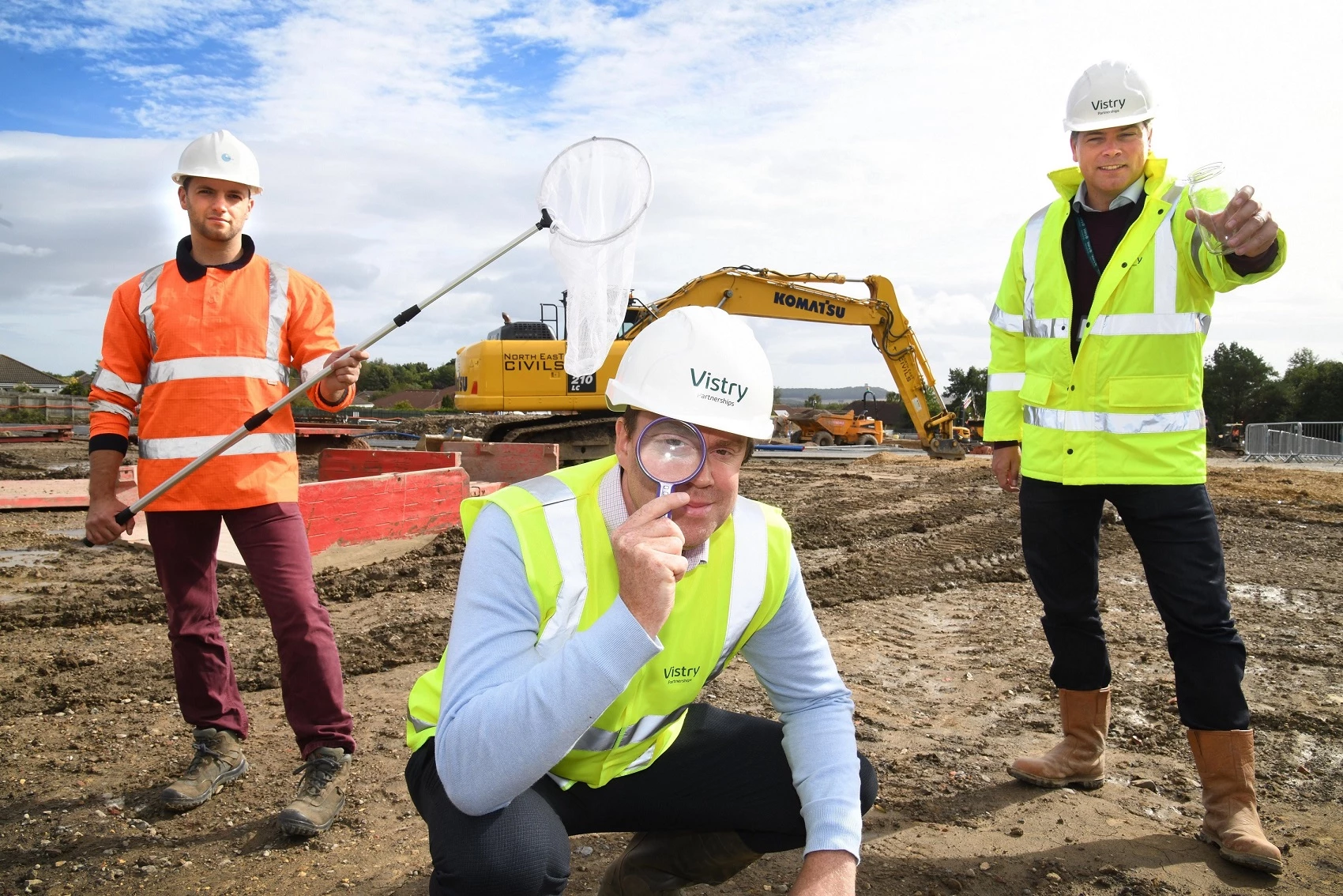
Partner Article
Developer helps rare butterfly spread wings
A leading North East regeneration and housing specialist is investing in schemes to help a threatened butterfly spread its wings and to create ecological attractions for local communities.
Vistry Partnerships North East has provided nearly £60,000 to protect the Dingy Skipper butterfly, which is in severe decline and to enhance the natural woodland adjacent to a new Washington development.
As part of a project to construct 56 homes on the former Ayton School site – developed in partnership with planning and design consultancy Barton Willmore and Sunderland City Council – ecologists were appointed to conduct a survey of the site before work began.
And E3 Ecology Limited identified evidence of the butterfly - protected in the UK under the Wildlife and Countryside Act (1981) – which has disappeared from 48% of UK habitats since then.
A fingertip search of a specific 20 square meter area revealed that butterfly larvae were hibernating inside the leaves of the grassland plants. So, a plan was hatched to carefully remove the turf and transport it to a specially prepared site, two miles away, alongside the Bowes Railway Local Wildlife Site, which will be monitored and managed for the next 20 years.
And as the much needed new, mixed tenure homes take shape, the butterfly also appears to be enjoying its new environment, according to Sunderland City’s Principal Ecologist, Claire Dewson. However, she points out that due to the COVID 19 lockdown, full monitoring of the spring hatch and migration will have to wait until next year.
Mike Perkins, a Senior Ecologist with E3 Ecology, said: “Dingy Skipper is one of the rarest and most threatened butterfly species in the UK. This scheme, the innovative processes involved and the forward thinking of Vistry Partnerships North East has shown that sustainable development and positive outcomes for our rarest species can be achieved whilst still delivering essential regeneration and housing requirements for the North East.”
Andrew Rennie, Development Director for Vistry Partnerships in the region, added: “There is much more to development and regeneration than the bricks and mortar. Investment to create or improve communities must also protect and enhance the environment in which we work. Being able to support - and hopefully protect - the Dingy Skipper Butterfly and encourage the biodiversity close to the housing development demonstrates our commitment to both of these important goals.”
In addition to the butterfly protection, the Ayton Park enhancement will include the planting of over 200 high diversity woodland species in the adjacent open spaces. These include garlic mustard, ramsons, betony, nettle leaved bell flower, wild foxglove, bluebell, meadow sweet, hedge bedstraw, herb Robert, wood avens, hairy St. John’s wort, wood forget me not, wild primrose, self-heal, red campion, hedge woundwort, greater stitchwort, wood sage and upright hedge parsley.
Sam Thistlethwaite, associate planner at Barton Willmore, said: “The protection of habitats for rare species and support for ecological diversity is a brilliant example of how the planning process can be used to enhance the natural environment. With this project we’ve been able to help Vistry Partnerships create an environmental legacy to be proud of.”
Councillor Kevin Johnston, deputy cabinet member for housing and regeneration at Sunderland City Council, added: “We’re delighted to be delivering developments in Sunderland with partners that are so focused on doing the right thing.
“As well as Vistry’s work to minimise the ecological impact of this development, the organisation is also doing a great deal to support the local community with a significant financial commitment that will help enhance community facilities in the area, as well as improving educational opportunities through support for the local school. This is a fantastic partnership with a socially responsible developer that we’re proud to work alongside.”
With grant support from Homes England – the government’s housing accelerator, which works to increase the number and speed of new homes of all tenures across the country - half of the 56 homes at Ayton will be available for shared ownership through Riverside Homes and half sold at market price by Linden Homes – Vistry’s housebuilding division.
Picture caption: Pictured on the Ayton Park development site, where a detailed search earlier revealed evidence of the threatened Dingy Skipper butterfly are (l/r); Mike Perkins, Cllr. Kevin Johnston and Andrew Rennie.
This was posted in Bdaily's Members' News section by Paul Dobbie .
Enjoy the read? Get Bdaily delivered.
Sign up to receive our daily bulletin, sent to your inbox, for free.








 Why community-based care is key to NHS' future
Why community-based care is key to NHS' future
 Culture, confidence and creativity in the North East
Culture, confidence and creativity in the North East
 Putting in the groundwork to boost skills
Putting in the groundwork to boost skills
 £100,000 milestone drives forward STEM work
£100,000 milestone drives forward STEM work
 Restoring confidence for the economic road ahead
Restoring confidence for the economic road ahead
 Ready to scale? Buy-and-build offers opportunity
Ready to scale? Buy-and-build offers opportunity
 When will our regional economy grow?
When will our regional economy grow?
 Creating a thriving North East construction sector
Creating a thriving North East construction sector
 Why investors are still backing the North East
Why investors are still backing the North East
 Time to stop risking Britain’s family businesses
Time to stop risking Britain’s family businesses
 A year of growth, collaboration and impact
A year of growth, collaboration and impact
 2000 reasons for North East business positivity
2000 reasons for North East business positivity